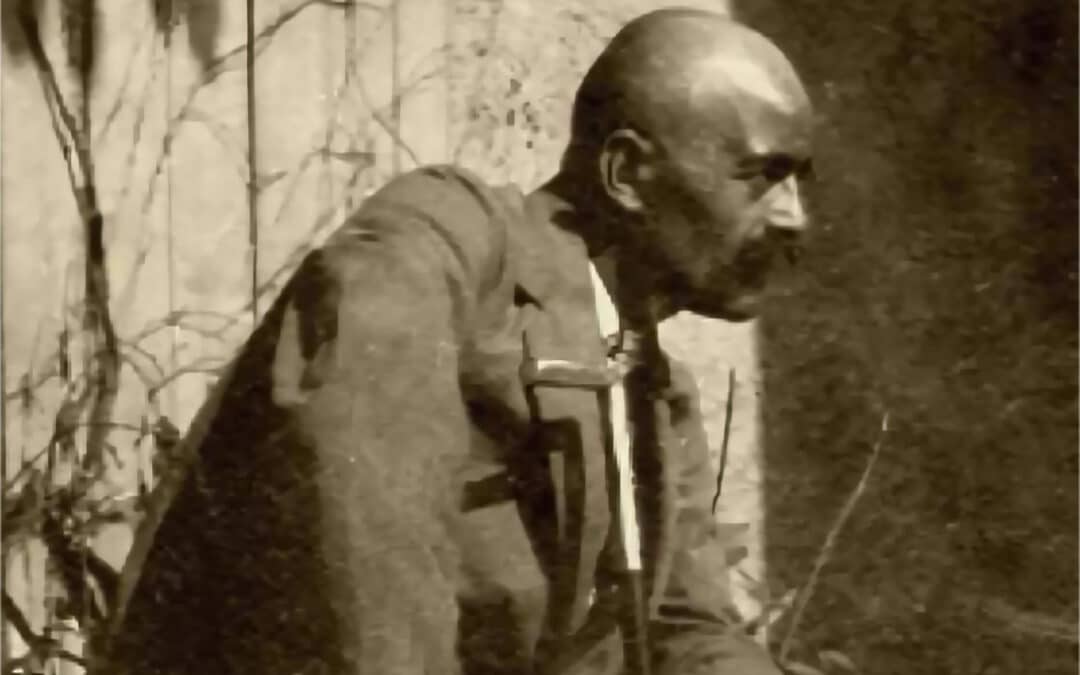Robin Bloor is a student of Rina Hands, who herself was a direct disciple of Gurdjieff. He is the director of the Austin Gurdjieff Society in Texas (USA) and author of many books, including “To Fathom the Gist: Volume 1 – Approaches to the Writings of G.I.Gurdjieff” and his latest book “Gurdjeff & Kundabuffer – Food for the Moon”. He organises several online groups for the study of Gurdjieff’s writings and Gurdjieff’s “Objective Science” and is the editor of a monthly newsletter, The Lost Herald.
Interview with Robin Bloor
How did you find the teachings of Gurdjieff? What was your first encounter?
I read about Gurdjieff in a couple of English books that I bought in 1980 while working in Milan. I became intrigued, particularly because one of the books provided notes on Gurdjieff’s “magnum opus” Beelzebub’s Tales to His Grandson. I became very intrigued by what was written, and when I returned to live in the UK, I bought the book and read it. It can be a difficult book to read, but I was enthralled by it.
A few years later, realizing that I could do very little alone, I began looking for groups of people who were working with Gurdjieff’s ideas. I joined one group, but soon left because I didn’t really fit with them. Then I joined another group that was led by Adam Nott – a man who had known Gurdjieff when he was young. But this group did not allow anyone in the group to participate in movements classes until they had been with them for 2 years.
I have read that you met your teacher Rina Hands for the first time in 1988. How did this come about, what role did she play in your life and what is your connection to her today?
A few months after I joined Adam Nott’s group, a friend of mine told me that a woman called Rina Hands had a Gurdjieff group in London and gave me her contact details. So I went to see her. She impressed me. I asked about movements, and she suggested I join one of her movements classes immediately – so I switched to her group.
Over the months and years that followed, Rina Hands became my teacher. She was a remarkable woman. She had been a pupil of Ouspensky and later became a close associate of John G Bennett. After the second world war she was in Paris with Gurdjieff and many of his other students. After Gurdjieff’s death she became a close associate of Mme De Salzmann.
She had more influence over my life than any other person I ever met. More than a parent, more than any friend or mentor. She was instrumental in teaching me many things that I could never have learned otherwise. She was, and still is an inspiration to me. There are things she said that I only understood many years later. In respect of the Work, what I do, I do as her pupil. It belongs more to her than me. She was a conscious individual – she had a quiet power.
Why did you start to write books about the teachings of Gurdjieff?
While in the UK I had come in contact with several Gurdjieff groups and none of them studied Gurdjieff’s writings in any depth. In 2002 I went to live in America and met several American groups some associated with the New York Gurdjieff Foundation. None of them knew anything about Gurdjieff’s writings. I attended a meeting of the All & Everything Conference which met annually and had been formed by some Gurdjieff enthusiasts to discuss and exchange ideas about Gurdjieff’s writings. It was clear at that meeting that nobody there knew much and that I knew a little more. So I wrote the first of many books – explaining ways to approach Gurdjieff’s writings.
The same proved to be true about Gurdjieff’s teaching of objective science. I searched for people who had some understanding of it, and I found none – nobody at all. So I began writing about that too. I wrote a book entitled Gurdjieff’s Hydrogens. I even gave a whole series of lectures explaining many aspects of it.
The books I write are text books of a kind. They seek to make the Work accessible.
Your latest book is called “Gurdjieff & Kundabuffer – Food for the Moon”. What is this book about and what is the meaning of “Food for the Moon”?
This is a large topic. When Gurdjieff first introduced his ideas in 1914 in Moscow, he said that one of the roles of all of Nature on this planet, including mankind, was that it fed the moon. At the time this was a wholly new and seemingly outrageous idea. Indeed it was rejected outright by many – including people who knew the power and truth of Gurdjieff’s psychological teachings, but found this suggestion too difficult to accept.
Nevertheless, it is so.
I wrote this book to explain some passages from Beelzebub’s Tales to His Grandson which dealt with this topic and to provide the scientific evidence that substances from nature do indeed pass to the moon, rising first to the ionosphere and then passing into the magnetosphere and finally passing as a stream of plasma to the Moon during the days around the full moon. Curiously, it was recently discovered that the Earth helps to create water on the Moon. See https://news.gatech.edu/news/2023/11/09/water-moon-may-be-forming-due-electrons-earth. There is a kind of umbilical between Earth and Moon.
How did the teachings of Gurdjieff influence your life? What changes have you experienced?
Gurdjieff taught that external events do not matter. What matters is how you are able to respond to those events inwardly – how you are able to “digest” those events. I now know this to be true.
For me, the Gurdjieff Work has made it possible for me to have some control over my inner life. Most people have no control whatsoever (even if they believe they do), so this is not a small thing.
Rina Hands taught me that “your being attracts your life.” In other words, the events of your life are drawn to you by what you are. On the surface, this sounds like an absurd idea, but in fact, as far as I can tell, it is exactly so. People think in terms of “cause and effect,” but this is a simplistic and wrong idea – reality is a little more complicated than that.
Publisher advaitaMedia will re-release “In Search of the Miraculous” by Ouspensky in German after it went out of print. What can you say about this book?
In my view it is the best introduction to the Work that has ever been written – and it was the first book to be published about the Gurdjieff Work. People who read it usually think of it as a very good book, but they also usually fail to understand most of it. This is entirely normal in the “spiritual domain.” There are some excellent books but very few people understand them.
Strange though it may seem, very few people actually know how to read.
It is remarkable that the second generation after Gurdjieff is now in their 70s. Where does the Gurdjieff movement stand today, and how is the teaching being passed on these days? What would you like to see for the future?
The Gurdjieff Work lost considerable force as each of the “Pupils of the First Rank” died and, as you point out, the second generation, which had considerably less force, is now old and will soon be gone. It was always going to go downhill after Gurdjieff died. However, it is possible that a counterforce will emerge soon, which may lead to some kind of continuance of the work Gurdjieff started.
Gurdjieff never stated what his goals were, but to those of us who followed in his wake, it is clear that Gurdjieff’s intent was to change the world of man irrevocably. Mankind is descending and this has to be reversed.
Everything needs to be rescued: man’s intellect which is captive to atheistic science and impotent belief, man’s emotional life which has descended into trivia. Art is no longer Art and our emotional life vegetates in front of the television and the computer screen. Our body has been deprived of its ability to develop skills by the industrial world and its machinery. We are a ruined species.
For the future, personally, I’d like to see a force emerge that could raise a certain portion of humanity from whence it fell. Gurdjieff hinted that he was a forerunner and that another would follow. So ultimately this is not about the Gurdjieff Work. There is knowledge that Gurdjieff brought that is available to anyone who cares to harvest it. This, I believe was one of his tasks, to repair the intellectual world of man.
Why are the studies of Gurdjieff’s texts often considered difficult, and how exactly do you facilitate it for readers of your books and participants in your workshops?
This is too big a question to answer in a few paragraphs, so be aware that there is much more to be said. His book, Beelzebub’s Tales to His Grandson, is difficult to read because he wrote it in a particular way (a unique way) that requires effort to read but, which will also present new ideas to the reader that will circumvent the usual blocks to learning.
His stated aim with the book was “To destroy, mercilessly, without any compromises whatsoever, in the mentation and feelings of the reader, the beliefs and views, by centuries rooted in him, about everything existing in the world.” To the sincere and diligent reader, it will have exactly that effect. It had that effect upon me.
Nevertheless, there are many difficulties here. People do not know how to read. They do not understand the language that they speak and read very well – in fact barely at all. It may seem that to access and understand the truth should be a simple thing, but it is not so at all. One has to learn how to access the truth – and few people know how.
So in this line, I teach etymology, I teach allegory, I teach analysis, I teach pondering, I teach how to read, I teach linguistics of a kind. I teach the octave. His second book Meetings With Remarkable Men seems far easier to access. And it is, but only on the surface.
We are honored that you are visiting from the US this June to be the keynote speaker at the event “In Search of the Miraculous – Introduction to Gurdjieff’s Teachings” at Gut Saunstorf Monastery. What made you agree and what would like to tell us in advance?
I agreed because I visited your website to see what kind of organization had invited me. I was impressed and felt that it would be worthwhile to do this. It was an honor to be invited. I was also keen to meet OM C Parkin.
Perhaps the only thing I can think to say in advance is that I will try to bring what can be useful to those who will attend. I bring fragments of knowledge and if it is used, I will not have wasted my time.
To the event “In Search of the Miraculous – Introduction to Gurdjieff’s Teaching” >


